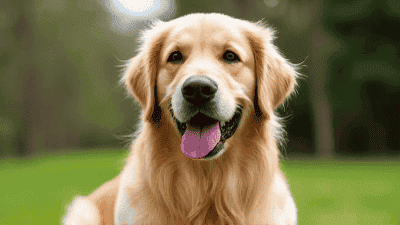
Golden Retrievers are one of the most beloved dog breeds in the world, known for their friendly nature, intelligence, and striking golden coats. Whether you’re considering adding a Golden Retriever to your family or already own one, understanding their characteristics and health care needs is essential for ensuring a happy and healthy life for your furry friend.
Golden Retrievers originated in Scotland during the mid-19th century. They were developed by Lord Tweedmouth, who aimed to create a dog that was skilled at retrieving game during hunts. The breed was a mix of the now-extinct Tweed Water Spaniel, Irish Setter, and Bloodhound.
Golden Retrievers quickly gained popularity due to their versatility, intelligence, and gentle temperament. Today, they are not only cherished as family pets but also excel as service dogs, therapy dogs, and search-and-rescue dogs.

Golden Retrievers are medium to large-sized dogs. Males typically weigh between 65-75 pounds, while females weigh between 55-65 pounds. Their height ranges from 21-24 inches at the shoulder.
Golden Retrievers have a dense, water-resistant double coat that can be straight or wavy. Their coat color varies from light gold to dark gold, and they are known for their feathering on the tail, legs, and chest.
The average lifespan of a Golden Retriever is 10-12 years, though some can live longer with proper care.
Golden Retrievers are known for their friendly and outgoing nature. They are great with children, other pets, and strangers, making them ideal family dogs.
Golden Retrievers are highly intelligent and eager to please, which makes them easy to train. They excel in obedience, agility, and other canine sports.
Golden Retrievers are active dogs that require regular exercise and mental stimulation. They love playing fetch, going for walks, and participating in outdoor activities.
Golden Retrievers are deeply loyal to their families and thrive on human companionship. They are affectionate dogs that enjoy being involved in family activities.

Hip dysplasia is a genetic condition where the hip joint doesn’t develop properly, leading to arthritis and mobility issues. Regular exercise and maintaining a healthy weight can help reduce the risk.
Similar to hip dysplasia, elbow dysplasia affects the elbow joint and can cause lameness and pain. Early detection and treatment are essential.
Golden Retrievers are prone to cataracts, which can lead to vision loss. Regular eye checkups can help detect and manage this condition.
Hypothyroidism occurs when the thyroid gland doesn’t produce enough hormones, leading to weight gain, lethargy, and skin problems. It can be managed with medication.
Golden Retrievers have a higher risk of developing cancer, including lymphoma and hemangiosarcoma. Regular vet checkups and early detection are crucial for improving outcomes.
Golden Retrievers can suffer from skin allergies caused by food, environmental factors, or flea bites. Identifying and managing allergens can help keep your dog comfortable.
Schedule annual vet visits to monitor your Golden Retriever’s health and catch any potential issues early.
Ensure your dog is up to date on core vaccinations, such as rabies, distemper, and parvovirus, as well as any non-core vaccines recommended by your vet.
Use flea, tick, and heartworm preventatives to protect your Golden Retriever from parasites that can cause serious health problems.
Brush your dog’s teeth regularly and provide dental chews or toys to prevent tartar buildup and gum disease.
Spaying or neutering can prevent certain health issues and reduce the risk of unwanted behaviors. Consult your vet for the best timing.

Feed your Golden Retriever a high-quality, balanced diet that meets their nutritional needs. Look for dog food with high protein content and limited fillers.
Golden Retrievers are prone to obesity, which can exacerbate health issues like hip dysplasia and heart disease. Measure their food and avoid overfeeding.
Keep your dog away from foods that are toxic to dogs, such as chocolate, grapes, onions, and xylitol.
Consider adding supplements like glucosamine, chondroitin, and omega-3 fatty acids to support joint health and overall well-being.
Golden Retrievers need at least 1-2 hours of exercise daily to stay healthy and happy. Activities like walking, running, swimming, and playing fetch are great options.
Provide puzzle toys, interactive games, and training sessions to keep your Golden Retriever mentally engaged.
Expose your dog to different environments, people, and animals to help them develop good social skills and reduce anxiety.
Brush your Golden Retriever’s coat 2-3 times a week to remove loose hair and prevent mats. During shedding season, daily brushing may be necessary.
Bathe your dog every 6-8 weeks or as needed using a dog-specific shampoo. Avoid over-bathing, as it can strip the coat of natural oils.
Trim your dog’s nails every 3-4 weeks to prevent overgrowth and discomfort.
Check and clean your dog’s ears weekly to prevent infections, especially if they swim frequently.
Brush your dog’s teeth several times a week to maintain good oral hygiene.
Begin training and socialization as early as possible to establish good habits and prevent behavioral issues.
Use positive reinforcement techniques, such as treats and praise, to encourage desired behaviors.
Be consistent with commands and routines to help your Golden Retriever understand expectations.
Golden Retrievers can develop behaviors like chewing, digging, or excessive barking. Provide appropriate outlets for their energy and address issues with patience and training.
Golden Retrievers do best in homes with access to a yard or outdoor space where they can exercise and play.
Golden Retrievers thrive on companionship and can develop separation anxiety if left alone for long periods. Provide toys and consider a dog sitter or daycare if needed.
Golden Retrievers are natural swimmers, but always supervise them around water to ensure their safety.
Join a Golden Retriever breed club or online community to connect with other owners, share tips, and participate in events.
Golden Retrievers excel in therapy and service roles. Consider involving your dog in volunteer work to share their loving nature with others.
Golden Retrievers are wonderful companions that bring joy and love to any household. By understanding their characteristics and providing proper health care, nutrition, and training, you can ensure your Golden Retriever lives a long, healthy, and fulfilling life. Whether you’re a first-time owner or a seasoned Golden Retriever enthusiast, your furry friend will reward you with loyalty, affection, and endless smiles.